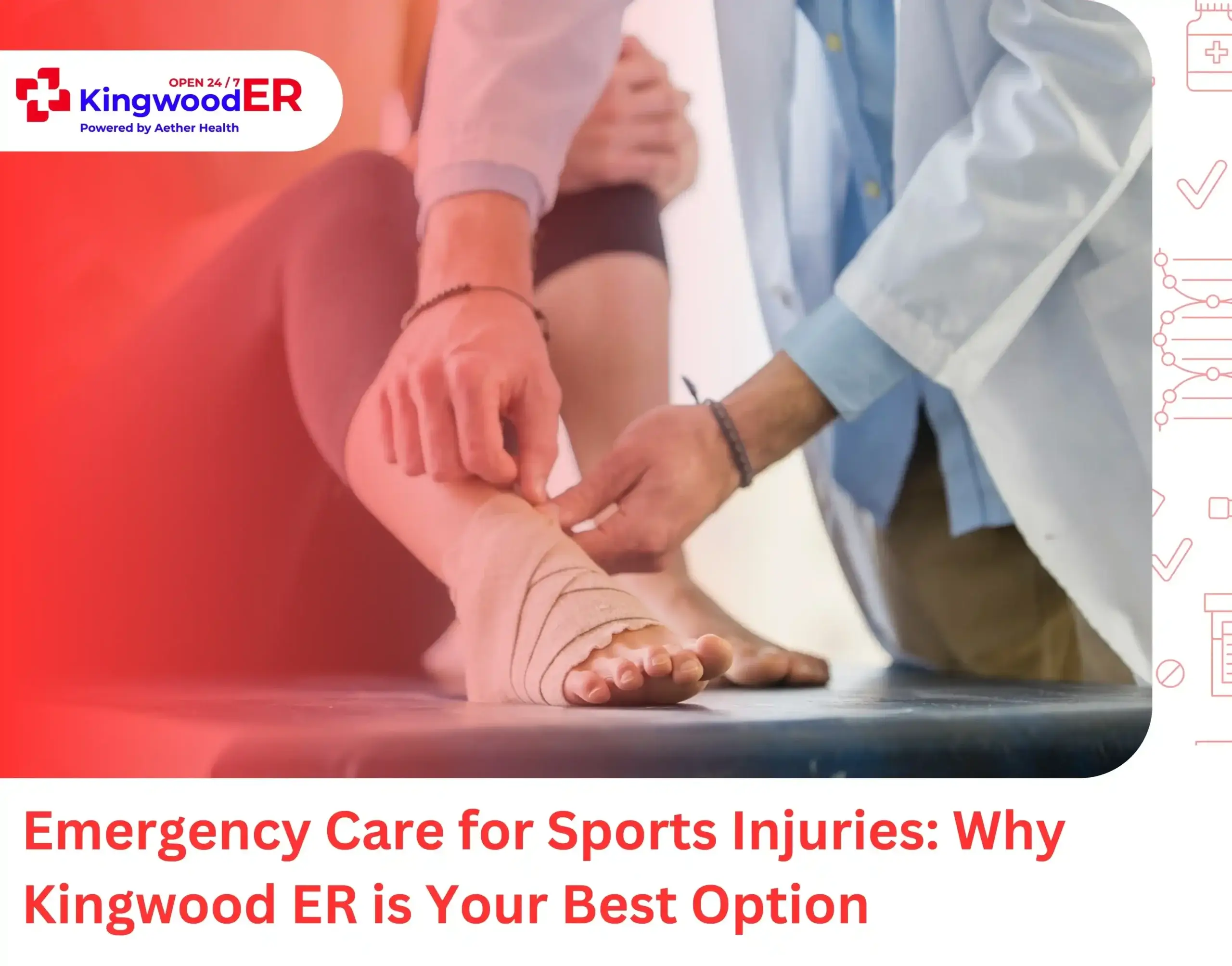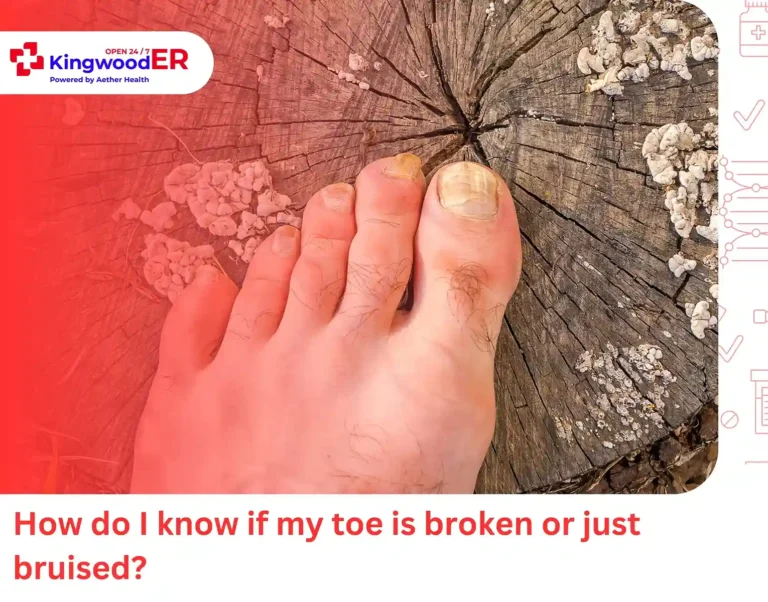One wrong move on the field changes everything. When pain shoots through your body, several questions race through your mind: How bad is it? Should I keep playing? Where do I go for help?
The old advice to “walk it off” or rush straight to a crowded hospital ER might not serve you best. Your next move matters, especially with serious sprains, fractures, or muscle tears.
At Kingwood ER, we provide emergency care for sports injury without the long waits at traditional ERs. Our team uses advanced imaging and in-house lab tests to evaluate your injury, and put you on the quickest to recovery.
Common Sports Injuries and Their Risks
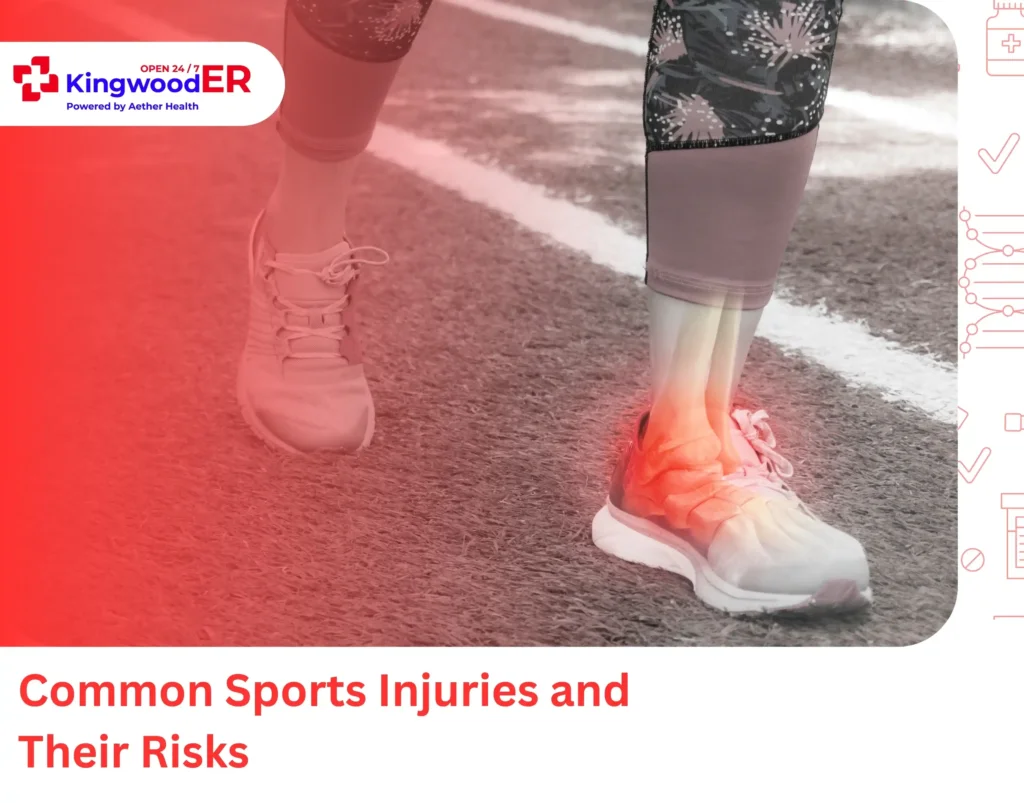
Sports injuries can range from mild sprains to severe fractures, often requiring immediate emergency intervention. Common sports-related injuries include:
Sprains and Strains
Sprains occur when ligaments are stretched or torn, while strains involve the overstretching or tearing of muscles or tendons. These injuries often result from sudden movements, improper warm-ups, or overexertion.
Symptoms of Sprains and Strains:
- Pain and tenderness around the affected area
- Swelling and bruising
- Limited motion of the muscle
- Muscle spasms (for strains)
- A popping sensation at the time of injury (for severe sprains)
Fractures (Broken Bones)
Fractures can be caused by direct impact, falls, or overuse. Immediate care for fracture is necessary to ensure proper alignment and healing.
Symptoms of Fractures:
- Intense pain and swelling
- Visible deformity or misalignment
- Inability to bear weight or use the affected limb
Dislocations
A joint dislocation occurs when bones are forced out of their normal positions, leading to intense pain and immobility. This condition requires immediate realignment to prevent long-term problems.
Symptoms of Dislocations:
- Severe pain and swelling
- Visible deformity
- Inability to move the joint
Concussions and Head Injuries
Head injuries are common in sports like football, soccer, and basketball. A concussion and brain injury need prompt assessment to prevent complications such as cognitive impairments and long-term neurological damage.
Symptoms of Concussions:
- Severe headache and dizziness
- Confusion and memory issues
- Nausea and sensitivity to light or sound
Tendon and Ligament Tears
Tears in major ligaments, such as the ACL (anterior cruciate ligament) or Achilles tendon, often require surgical intervention.
Symptoms of Tendon and Ligament Tears:
- A popping sound at the time of injury
- Sudden and intense pain
- Difficulty moving the affected joint
Cuts and Lacerations
Sharp impacts or falls can cause deep cuts that might require stitches or other forms of wound care.
Symptoms of Cuts and Lacerations:
- Continuous bleeding and open wounds
- Pain and swelling around the injury site
Without immediate medical attention, these injuries can lead to complications such as chronic pain, joint instability, and decreased athletic performance.
Why Immediate Emergency Care is Critical for Sports Injuries
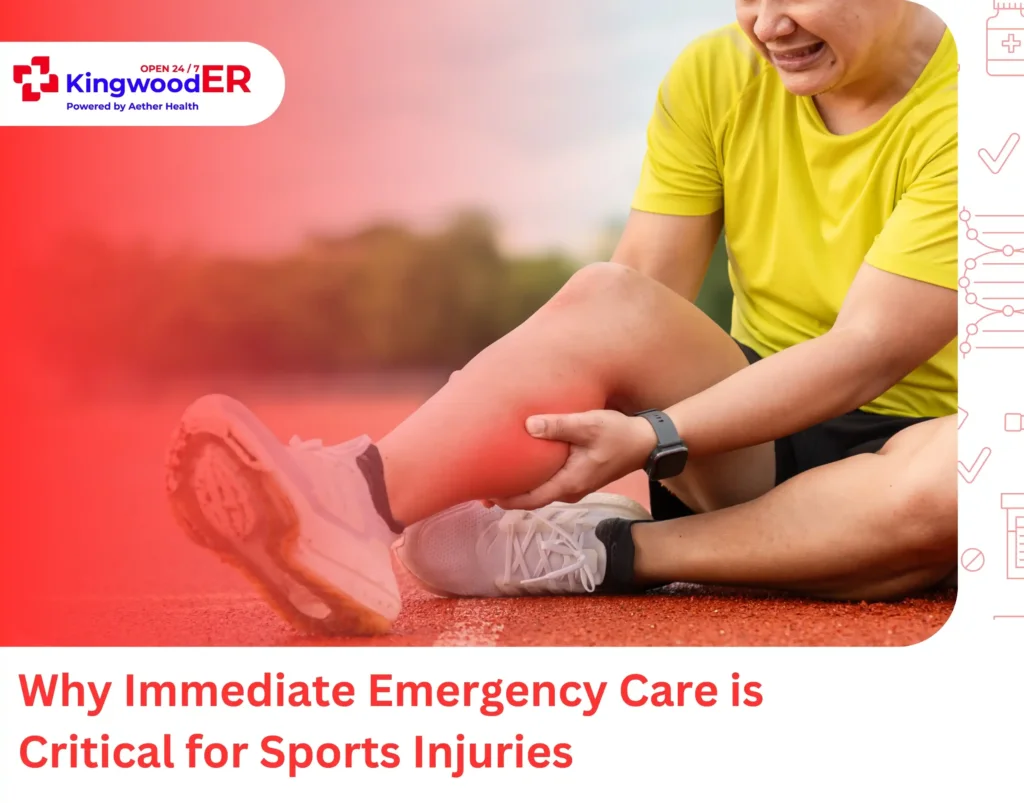
Prompt treatment of sports injuries is vital to prevent complications, reduce pain, and speed up the recovery process. Here’s why immediate emergency care is necessary:
- Preventing Further Damage: Delayed treatment can worsen injuries, leading to long-term issues such as arthritis or permanent mobility limitations.
- Pain Management: Immediate care helps control pain effectively, preventing unnecessary suffering.
- Accurate Diagnosis: Advanced evaluation techniques at emergency rooms ensure that injuries are properly diagnosed and treated.
- Faster Recovery: Early intervention with appropriate treatments, such as immobilization, medication, or surgery, enhances healing.
Expert Sports Injury Care at Kingwood ER
Kingwood ER provides top-tier emergency care tailored to active individuals. Here’s why you can count on us for treating emergency sports injuries:
1. 24/7 Availability for Immediate Care
Sports injuries happen on different schedules, and waiting for an appointment can worsen an injury. Kingwood ER operates 24/7, ensuring that athletes receive immediate medical attention when they need it the most.
2. Highly Skilled and Specialized Medical Staff
Kingwood ER has a team of experienced emergency physicians and trained nurses who understand the unique needs of all patients. Their expertise ensures precise diagnosis and effective treatment plans tailored to individual injuries.
3. State-of-the-Art Diagnostic Technology
Accurate diagnosis is critical for effective treatment. Kingwood ER is equipped with:
- Digital X-rays for detecting fractures and dislocations.
- CT scans and MRIs for assessing soft tissue injuries and concussions.
- Ultrasound technology to diagnose muscle and ligament injuries quickly.
- Minimal Wait Times
Unlike traditional hospital ERs, Kingwood ER ensures rapid service with a minimal wait period. Quick evaluation and treatment means you can return to recovery quicker.
6. Seamless Coordination with Specialists
For cases requiring ongoing treatment, Kingwood ER facilitates smooth referrals to orthopedic surgeons, physical therapists, and sports medicine specialists, ensuring continuity of ongoing care.
7. Comprehensive Rehabilitation Support
Post-injury rehabilitation is crucial for full recovery. Kingwood ER works closely with rehabilitation specialists to create personalized recovery plans that include:
- Physical therapy referrals
- Guidance on rehabilitation exercises
- Follow-up care recommendations
Essential Injury Prevention Tips for Athletes
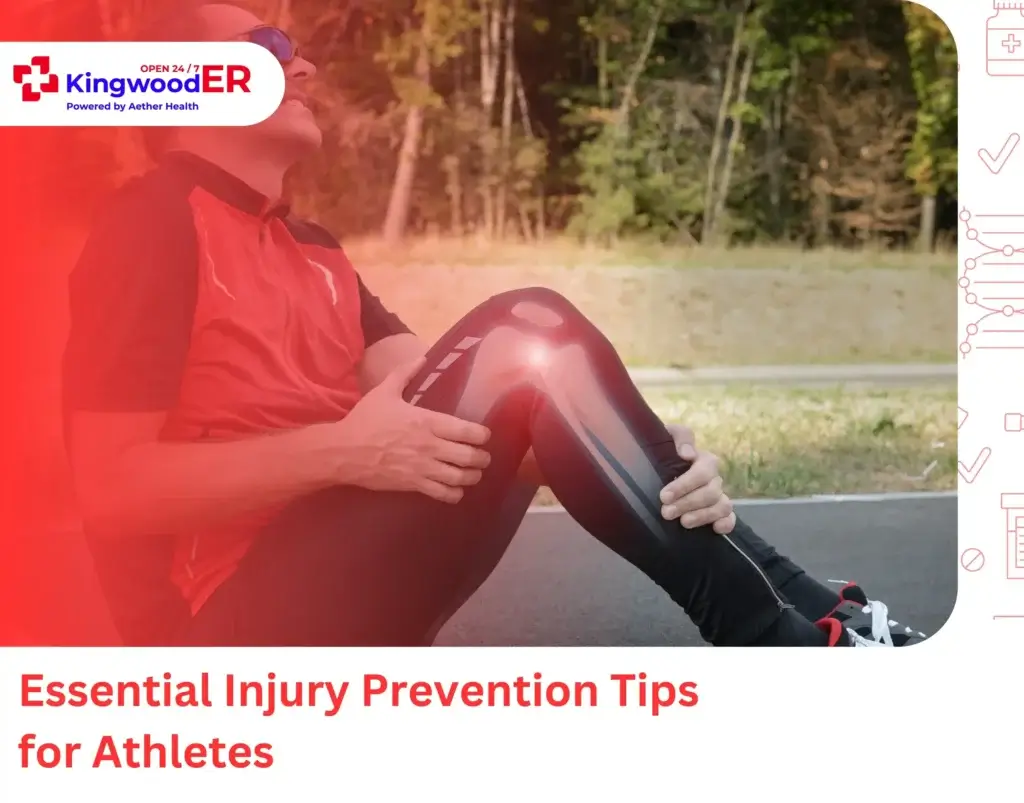
While emergency care is essential, injury prevention should also be a priority. Athletes can reduce their risk of sports-related injuries by following these guidelines:
1. Prioritize Proper Warm-Ups and Cool-Downs
Engaging in warm-ups before activity and stretching after exercise helps prevent muscle and ligament injuries. This routine enhances circulation and helps prevent muscle from strains or sprains.
2. Wear the Right Gear for Your Sport
Protective equipment, such as helmets, padding, and proper footwear, reduces the risk of serious injuries. Proper gear ensures safety and comfort, allowing athletes to perform their best without worry.
3. Master Proper Technique and Form
Building strength and flexibility through training enhances stability and over time reduces the risk of injury and improves overall performance. Over time, mastering good technique also reduces the chance of repetitive strain injuries.
4. Stay Hydrated and Maintain Proper Nutrition
Staying hydrated and maintaining a balanced diet supports muscle function and recovery. Water helps regulate body temperature, while nutrients like protein and vitamins aid in muscle repair. A proper diet enhances stamina, boosts energy, and supports long-term athletic performance.
5. Listen to Your Body
Paying attention to pain and fatigue signals helps prevent overuse injuries and ensures adequate recovery time. Athletes should take rest days and avoid pushing through discomfort. Early intervention when pain arises helps prevent long-term damage and promotes quicker recovery.
Key Takeaway
Sports injuries require immediate and specialized care to ensure proper healing and prevent long-term issues. Kingwood ER is the best option for emergency sports injury treatment, offering expert medical care, cutting-edge diagnostic tools, and personalized treatment plans.
Don’t let a sports injury sideline you or your kid. Visit Kingwood ER today to start your healing journey.
FAQs
What to do if you get injured?
Immediately stop the activity, assess the injury, and apply first aid (such as ice for swelling or immobilization for fractures). If the injury is severe like dislocation or fracture, seek emergency medical care for prompt evaluation and treatment.
How to recover from an injury faster?
To speed up recovery, follow the R.I.C.E. method (Rest, Ice, Compression, Elevation) for minor injuries and adhere to medical advice. Maintain a nutritious diet, stay hydrated, get enough rest, and avoid rushing back to sports before full recovery to prevent re-injury.
Who takes care of injured athletes?
Injured athletes are taken care of by the sports medicine doctors, orthopedic specialists, physical therapists, athletic trainers, and emergency physicians. In severe cases, our emergency room in Kingwood provides immediate treatment, including diagnosis, pain management, and necessary medical interventions.

